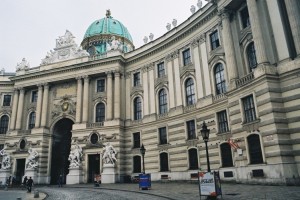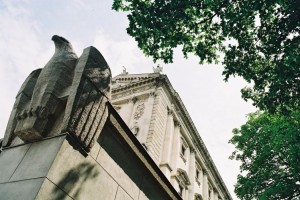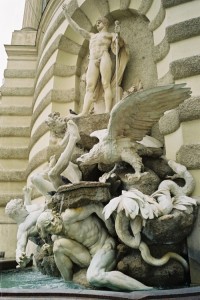Vienna University’s Impartiality In Question
| During December 2008, I was invited by the Elfriede Jelinek Research Centre at the University of Vienna to take part in a discussion concerning her play ‘Rechnitz (Der Würgeengel)’ to take place in May 2009. Some four weeks prior to the event, I discovered one of the sponsors of the series of lectures and discussions under the title ‘Endless Innocence’ was to be Francesca Habsburg, nee Thyssen, in the form of her art foundation Thyssen-Bornemisza Art Contemporary (T-B A21). My introductory statement which I gave on the evening of 5 May in Vienna was largely in response to this situation. It read as follows:
‘I would like to say how gratified I am to have played such a major part in persuading Francesca Thyssen to accept, as part of her financial inheritance, some responsibility for her family’s behaviour. I believe this to be manifest in her sponsoring of this event. However, I would have been even more gratified if she had made an apologetic admission, as opposed to a financial contribution, for being that the Thyssens were sponsors of Rechnitz Castle and the Countess (and I do have documentary evidence of that fact with me tonight), I consider there to be something obscenely ironic about the fact that we are all sitting here, 64 years later, discussing the Rechnitz Massacre, or a play by Elfriede Jelinek, which includes the massacre, while yet again being sponsored by The Thyssens in the form of Francesca’s art foundation. I am also forced to question how, as long as any doubt remains concerning the extent of the Thyssens’ involvement in the Rechnitz Massacre, Vienna University can accept her money while claiming impartiality. Unfortunately, this conflict of interest is not a unique situation in the academic world, particularly in the case of Wolfgang Benz, head of Anti-Semitism Research at the Technical University of Berlin, and Richard Evans, Chairman of the Faculty of History at Cambridge University, who have both attempted to discredit my writing in Frankfurter Allgemeine Zeitung and my book, ‘The Thyssen Art Macabre’, published in Germany under the title ‘Die Thyssen-Dynastie’, while accepting funding from the Fritz Thyssen Stiftung. I am sad to say that I consider this type of arrangement brings into question the credibility of academic historians. I now have another question. If Countess Margit Batthyany, nee Thyssen, sponsored the murder of 200 Hungarian Jews as after-dinner entertainment and possibly even played an active role in their murder, and then Elfriede Jelinek writes a play involving the atrocity, which can also be characterised as entertainment, albeit intellectual entertainment, but which I’m sure everyone here considers a work of art, where does that leave the killing of the Jews? As I hope and believe is obvious from my article in Frankfurter Allgemeine Zeitung and my book ‘Die Thyssen-Dynastie’, I consider it a crime against humanity. And no amount of art sponsorship, intellectual smoke screens or academic denial is ever going to alter that.’ I was subsequently informed that Francesca had promised the university to make a public statement, but had failed to do so, despite numerous reminders, prior to her departure to her house in Jamaica. (For the German version of my statement, please go to ‘Events’). |
Tags: Elfriede Jelinek, Elfriede Jelinek Research Centre, Francesca Habsburg, Francesca Thyssen, Fritz Thyssen Stiftung, Margit Batthyany, Rechnitz Castle, Rechnitz Massacre, Richard Evans, Thyssen-Bornemisza Art Contemporary, Wolfgang Benz
Both comments and pings are currently closed.




